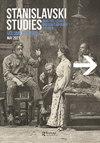Konstantin Stanislavski on the professional and ethical education of the film actor: based on the silent films of Boris Sushkevich, Yakov Protazanov, Aleksander Sanin, and Yuri Zhelyabuzhski
IF 0.2
0 THEATER
引用次数: 1
Abstract
ABSTRACT Stanislavski’s attitude to the cinematic art in general and acting in particular changed throughout his life. On the one hand, Stanislavski’s initial negative position on filming actors from the MAT for the first silent films is well-known, but on the other, numerous colleagues who worked at the interface of theatre and cinema confirmed Stanislavski’s attention to the actor’s play within the then emerging movie art, and the adoption of professional and ethical standards in both. One of the co-founders of the Russian film company Rus’, Moisei Aleynikov, highlighted in his memoirs Stanislavski’s profound conviction that “cinematography carri[ed] in it some new laws of performing art” and that in order to research cinematographic art and the professional and ethical development of film actors one had to carry out “hard, systematic experimental work”, comparable with what Stanislavski conducted in the theatre. Because of his time-consuming involvement in theatre, Stanislavski postponed and then delegated the exploration of filmmaking to Leopold Sulerzhitski, months before his sudden death froze the research again. Notwithstanding the absence of such research, from 1915 Stanislavski regularly involved his best actors and directors in filmmaking. Subsequently, early silent films starring theatre actors were assessed by Stanislavski, directly or indirectly. The results of his assessment can be found in the works of the first Russian creators of feature films. Focusing on the works of the four filmmakers included in its title, this paper aims to explore the development of Stanislavski’s attitude to the professional and ethical education of the film actor.康斯坦丁·斯坦尼斯拉夫斯基论电影演员的职业道德教育:以鲍里斯·苏什克维奇、雅科夫·普罗塔扎诺夫、亚历山大·萨宁和尤里·日利亚布日斯基的默片为例
斯坦尼斯拉夫斯基对电影艺术的态度,尤其是对表演的态度,终其一生都在改变。一方面,斯坦尼斯拉夫斯基最初对从MAT拍摄第一部默片演员的负面立场是众所周知的,但另一方面,许多在戏剧和电影接口工作的同事证实了斯坦尼斯拉夫斯基在当时新兴的电影艺术中对演员戏剧的关注,以及在这两者中采用的专业和道德标准。俄罗斯罗斯电影公司的创始人之一莫伊谢伊·阿列尼科夫(Moisei Aleynikov)在他的回忆录中强调了斯坦尼斯拉夫斯基的深刻信念,即“电影艺术包含了表演艺术的一些新规律”,为了研究电影艺术以及电影演员的专业和道德发展,人们必须进行“艰苦、系统的实验工作”,堪比斯坦尼斯拉夫斯基在剧院所做的工作。由于斯坦尼斯拉夫斯基在戏剧上花费了大量的时间,他推迟了对电影制作的探索,然后将其委托给了利奥波德·苏勒日茨基,几个月后,他的突然去世再次冻结了这项研究。尽管缺乏这样的研究,但从1915年开始,斯坦尼斯拉夫斯基经常让他最好的演员和导演参与电影制作。随后,斯坦尼斯拉夫斯基直接或间接地对早期由戏剧演员主演的无声电影进行了评估。他的评价结果可以在俄罗斯第一批故事片创作者的作品中找到。本文以标题中所包含的四位电影人的作品为中心,探讨斯坦尼斯拉夫斯基对电影演员职业道德教育态度的发展。
本文章由计算机程序翻译,如有差异,请以英文原文为准。
求助全文
约1分钟内获得全文
求助全文

 求助内容:
求助内容: 应助结果提醒方式:
应助结果提醒方式:


